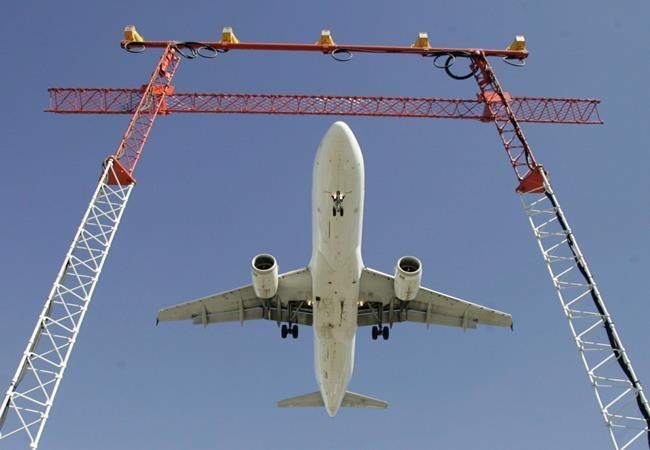
An Air Canada flight makes its final approach as it lands at Pearson International Airport in Toronto on Sept. 30, 2004. The holiday travel season could be affected by delays as the air transport sector's persisting labour shortages will cause unavoidable service disruptions says the president of the Canadian Air Traffic Control Association. THE CANADIAN PRESS/Adrian Wyld
Republished October 27, 2022 - 1:40 PM
Original Publication Date October 27, 2022 - 8:36 AM
OTTAWA - The airline industry is warning that flight disruptions will be unavoidable this upcoming holiday travel season as an ongoing labour shortage drags on.
At a parliamentary committee hearing Wednesday, travel industry representatives said problems retaining certain workers, such as pilots and air traffic controllers, persist heading into the busy winter season.
Air Line Pilots Association Canada president Tim Perry told MPs that airlines are not doing enough to retain pilots because they have resisted increasing their pay.
Referring to the problem surround pilots in this country as a labour shortage is an "oversimplification," Perry said.
He said airlines are relying on temporary foreign workers to fill the employment gap, which in some cases raises concerns around training and safety.
Pilots from other jurisdictions are fundamentally disconnected from their union and can undermine the collective bargaining process as a whole, said Perry.
New job vacancy numbers from Statistics Canada on Thursday show the country's tight labour market continuing in August as vacancies were little changed from July.
The vacancy rate in the transportation warehousing industry was 5.9 per cent in August, down a full percentage point from the month prior, but it remains one of the sectors with the highest rate of job vacancies.
Canadian Air Traffic Control Association president Nick von Schoenberg told the committee there is a desperate shortage of air traffic controllers that has put unacceptable demands on workers because there are no longer enough controllers to meet requirements.
"Historical short-staffing has meant that the system has always relied on a high amount of overtime by controllers to function," said von Schoenberg.
"This is resulting in unacceptable demands on workers as they are routinely expected to work long days with insufficient support."
The air traffic controller shortage existed long before the pandemic and will not be addressed in time for next summer, said von Schoenberg, but may be mitigated with some creative solutions.
Andrew Gibbons, vice-president of external affairs for WestJet, was also at the committee meeting and said the pandemic was the greatest crisis his company and the sector has ever faced.
"We're not out of the woods," said Andrew Gibbons. "We're still facing the effects of this crisis."
Von Schoenberg said that the pace and strength of the recovery by the aviation sector has contributed to the shortage of air traffic controllers, which in turn is contributing to delays.
He called on NAV Canada for a reliable training system and said that the corporation must do whatever it takes to retain staff.
Nav Canada spokesman Brian Boudreau confirmed that staffing levels have been an issue at some airports and may have impacted service as a result.
The air navigation operator plans to hire 500 new employees this year and aims to train 500 prospects over the next two years, with another 250 already enrolled in Nav Canada's training program, said Boudreau.
The National Airlines Council of Canada did not provide a comment on the matter of pilot staffing levels.
Representatives from both the council and Nav Canada are scheduled to attend the next parliamentary meeting on labour shortages on Monday.
This report by The Canadian Press was first published Oct. 27, 2022.
News from © The Canadian Press, 2022